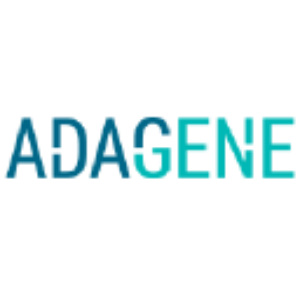Adagene Presents Results at ESMO Congress that Show Best-in-Class Therapeutic Potential for Anti-CTLA-4 SAFEbody® ADG126 (Muzastotug) in Combination with KEYTRUDA® (Pembrolizumab) in Advanced/Metastatic Microsatellite-stable (MSS) Colorectal Cancer (CRC)
Rhea-AI Summary
Adagene Inc. (Nasdaq: ADAG) presented promising results for its anti-CTLA-4 SAFEbody® ADG126 (Muzastotug) in combination with KEYTRUDA® (Pembrolizumab) at the ESMO Congress. The phase 1b/2 trial focused on advanced/metastatic microsatellite-stable (MSS) colorectal cancer (CRC) patients. Key findings include:
1. Doubled confirmed partial responses to four since ASCO GI in MSS CRC patients without liver and peritoneal metastases, with a 24% overall response rate.
2. Median progression-free survival of 8.5 months in patients without liver and peritoneal metastases at ADG126 10 mg/kg Q3W dose.
3. 12-month overall survival rates of 74% for patients without liver metastases and 82% for those without liver and peritoneal metastases at 10 mg/kg dose.
4. Maintained safety profile with only 16% Grade 3 TRAEs in patients treated with ADG126 10 mg/kg Q3W combined with pembrolizumab.
Positive
- Doubled confirmed partial responses to four in MSS CRC patients without liver and peritoneal metastases
- 24% overall response rate (ORR) with ADG126 10 mg/kg Q3W in combination with pembrolizumab
- Median progression-free survival of 8.5 months observed in patients without liver and peritoneal metastases
- 12-month overall survival rates of 74% for patients without liver metastases and 82% for those without liver and peritoneal metastases
- Low rate of Grade 3 TRAEs (16%) in patients treated with ADG126 10 mg/kg Q3W in combination with pembrolizumab
- No dose-limiting toxicities or Grade 4/5 TRAEs observed at any dose up to 20 mg/kg Q3W
- Overall disease control rate of 88% in patients without liver and peritoneal metastases
Negative
- efficacy in patients with liver metastases
- Seven patients developed treatment-related serious adverse events
- 8% discontinuation rate due to adverse events
News Market Reaction 1 Alert
On the day this news was published, ADAG declined 21.20%, reflecting a significant negative market reaction.
Data tracked by StockTitan Argus on the day of publication.
- Confirmed partial responses (PRs) doubled to four since ASCO GI in MSS CRC patients without liver and peritoneal metastases for overall response rate (ORR) of
- Median progression-free survival of 8.5 months observed in patients without liver and peritoneal metastases at the ADG126 10 mg/kg Q3W dose -
- At the 10 mg/kg dose level, 12-month overall survival (OS) rates were
- Safety profile maintained, with only
- Combination shows potential with standard of care to address broader patient populations, including MSS CRC patients with liver metastases -
SAN DIEGO and SUZHOU, China, Sept. 16, 2024 (GLOBE NEWSWIRE) -- Adagene Inc. (“Adagene”) (Nasdaq: ADAG), a company transforming the discovery and development of novel antibody-based therapies, today announced new ADG126 clinical data presented at the ESMO Congress, taking place in Barcelona, Spain, September 13-17.
The poster, titled Increased Therapeutic Index of Muzastotug (ADG126), a Masked Anti-CTLA-4 Antibody, in Combination with Pembrolizumab (Pembro) Enables Significant Clinical Benefits and Supports Further Clinical Development in Patients with Metastatic MSS CRC, reports data from an ongoing phase 1b/2 trial of Adagene’s masked anti-CTLA-4 SAFEbody in combination with Merck & Co., Inc., Rahway, NJ, USA's anti-PD-1 therapy KEYTRUDA® (pembrolizumab) (ADG126-P001; NCT05405595).
“I am delighted that the ESMO data show a promising overall response rate, progression-free survival (PFS) and early survival benefit from treatment with the immunotherapy (IO) doublet of ADG126 in combination with pembrolizumab for patients with advanced/metastatic MSS CRC, the largest segment of colorectal cancer with few treatment options,” said Daneng Li, MD, Associate Professor in the Department of Medical Oncology & Therapeutics Research at the City of Hope Comprehensive Cancer Center, and a study investigator. “With a much higher dosing level than available anti-CTLA-4 therapies, these data reinforce the encouraging safety and efficacy profile for ADG126 administered repeatedly in MSS CRC.”
Dr. Li continued, “Given the best-in-class potential for ADG126, this combination with pembrolizumab could address even broader patient populations, such as those with liver metastases, particularly if combined with standard of care to control early disease progression. Further, the safety profile of this immunotherapy doublet enables repeat cycles to achieve and sustain sufficient drug exposure that maximizes potential for a long-term survival benefit.”
ADG126 is a masked anti-CTLA-4 SAFEbody targeting a unique epitope of CTLA-4 on regulatory T cells (Tregs) in tumor tissue which shows potential best-in-class safety and efficacy profiles in combination with pembrolizumab. The unique epitope of ADG126 alone has shown enhanced antibody-dependent cell mediated cytotoxicity without Fc engineering, which is associated with significantly increased toxicity. Further, it has shown minimal immunogenicity and anti-drug antibodies, with no impact on its pharmacokinetic (PK) profile.
Key highlights from the poster (July 30, 2024 data cutoff) include:
- ADG126 in combination with pembrolizumab continued to demonstrate a differentiated safety profile in dose escalation and dose expansion cohorts for heavily pre-treated advanced/metastatic patients with solid tumors (n=66):
- No dose-limiting toxicities (DLT) or Grade 4 or 5 TRAEs were observed at any dose up to 20 mg/kg Q3W, which was evaluated in dose escalation (n=6) to support an ongoing loading dose cohort.
- No Grade 3 colitis was observed at any dose, with limited use of infliximab to manage immune-mediated diarrhea/colitis in no more than
10% of patients. - No significant late-onset toxicities were observed after repeat dosing at the 10 mg/kg dose level. TRAEs by week from treatment start are summarized in the poster.
- Grade 3 TRAEs occurred in only
6% of patients at the 10 mg/kg Q6W dose (1/17) and16% of patients at the 10 mg/kg Q3W dose (6/37). Standard of care treatments are associated with higher rates of toxicities. - Seven patients developed treatment related SAEs; however, the discontinuation rate remains low at
8% (5/66).
- No dose-limiting toxicities (DLT) or Grade 4 or 5 TRAEs were observed at any dose up to 20 mg/kg Q3W, which was evaluated in dose escalation (n=6) to support an ongoing loading dose cohort.
- ADG126 administered at 10 mg/kg Q6W or Q3W in combination with pembrolizumab (200 mg/Q3W) demonstrated an encouraging efficacy signal, durable disease control and an early survival benefit in MSS CRC patients, with dose-dependent efficacy and objective responses per RECIST criteria observed for the Q3W schedule:
- In the subset of efficacy evaluable patients without liver and peritoneal metastases (n=17) who received ADG126 10 mg/kg Q3W, an ORR of
24% was observed, including four confirmed PRs. These results are consistent with earlier ORR data published at ASCO GI 2024. Response rates for current standard of care treatments range from1% to6.3% *. - An additional 11 patients had stable disease (SD) for an overall disease control rate (DCR) of
88% (15/17). - Further, a median PFS of 8.5 months was observed in the subset at the ADG126 10 mg/kg Q3W dose and median PFS was 5.9 months for patients at the ADG126 10 mg/kg Q6W dose.
- The 12-month OS rates were
74% for those patients without liver metastases (n=36), and82% in those without liver and peritoneal metastases (n=24) in the combined 10 mg/kg Q6W and Q3W cohorts. - While the 10 mg/kg Q3W cohort demonstrated efficacy with RECIST responses and the Q6W did not, early OS rates appear comparable for both doses. This suggests that the Q6W could be used as a starting point for future combination trials, or as a dose modification strategy for safety management.
- Additionally, results in patients without liver metastases who received at least four cycles of the combination showed comparable OS rates to those without liver and peritoneal metastases, highlighting the importance of early disease control with standard of care to enable the IO doublet to drive a long-term survival benefit.
- In the subset of efficacy evaluable patients without liver and peritoneal metastases (n=17) who received ADG126 10 mg/kg Q3W, an ORR of
- In dose escalation, the 20 mg/kg Q3W dose level was tolerable for the initial cycle (n=6). Based upon the safety profile of the initial dose, 20 mg/kg is being evaluated as a loading dose in an expansion cohort that has enrolled 12 patients. This cohort is evaluating a single dose of ADG126 at 20 mg/kg followed by a 10 mg/kg Q3W maintenance dose in combination with pembrolizumab. Initial data for this cohort are expected later this year.
- Comprehensive PK and exposure response analyses were also conducted to provide insight on various dosing regimens and their correlation to safety and efficacy of the combination. These results reinforce the increased therapeutic index of ADG126, underscoring a key advantage of the SAFEbody® precision masking technology. The extensive PK data also guide future clinical development and dose selection to meet FDA’s Project Optimus dose optimization requirements.
Commenting on these promising results, Peter Luo, Adagene’s CEO and President of R&D said, “We are thrilled that today’s update continues to reinforce the clinical benefits of the best-in-class therapeutic potential for ADG126 at the 10 mg/kg dose level in combination with pembrolizumab in MSS CRC. Armed with these results and the anticipated findings from our ongoing 20 mg/kg loading dose regimen, we are moving ahead with plans to evaluate ADG126 in MSS CRC at 10- to 20-fold higher doses than ipilimumab in a randomized, registration-oriented clinical program. With safety comparable to historical data for pembrolizumab monotherapy, these data provide a solid foundation for the potential of an IO doublet targeting CTLA-4 and PD-1 to move into earlier lines of therapy and broader patient populations, particularly when combined with standard of care aiming for a transformational improvement in patient outcomes.”
KEYTRUDA® is a registered trademark of Merck Sharp & Dohme LLC, a subsidiary of Merck & Co., Inc., Rahway, NJ, USA.
SAFEbody® is a registered trademark in the United States, China, Australia, Japan, Singapore, and the European Union.
*Grothey et al. Lancet. 2013;381: 303-312; FDA label, 12/10/2020. Mayer et al. N Eng J Med. 2015;372: 1909-1919. Marcus et al. Clin Cancer Res; 23(12) June 15, 2017;2924-2927. Josep Tabernero et al. 2023 ASCO Gastrointestinal. Gerald W. Prager et al. N Engl J Med 2023 May 04;388(18). Shukui Qin et al. 2019 CSCO. Jin Li et al. JAMA. 2018;319(24): 2486-2496. Andrea J. Bullock et al. 2023 ESMO-GI. Anthony B et al. 2023 ASCO-GI. Elena et al. 2021 ASCO. E. Garralda et al. 2022 ESMO.
About Adagene
Adagene Inc. (Nasdaq: ADAG) is a platform-driven, clinical-stage biotechnology company committed to transforming the discovery and development of novel antibody-based cancer immunotherapies. Adagene combines computational biology and artificial intelligence to design novel antibodies that address globally unmet patient needs. The company has forged strategic collaborations with reputable global partners that leverage its SAFEbody® precision masking technology in multiple approaches at the vanguard of science.
Powered by its proprietary Dynamic Precision Library (DPL) platform, composed of NEObody™, SAFEbody, and POWERbody™ technologies, Adagene’s highly differentiated pipeline features novel immunotherapy programs. The company’s SAFEbody technology is designed to address safety and tolerability challenges associated with many antibody therapeutics by using precision masking technology to shield the binding domain of the biologic therapy. Through activation in the tumor microenvironment, this allows for tumor-specific targeting of antibodies in tumor microenvironment, while minimizing on-target off-tumor toxicity in healthy tissues.
Adagene’s lead clinical program, ADG126 (Muzastotug), is a masked, anti-CTLA-4 SAFEbody that targets a unique epitope of CTLA-4 in regulatory T cells (Tregs) in the tumor microenvironment. ADG126 is currently in phase 1b/2 clinical studies in combination with anti-PD-1 therapy, particularly focused on Metastatic Microsatellite-stable (MSS) Colorectal Cancer (CRC). Validated by ongoing clinical research, the SAFEbody platform can be applied to a wide variety of antibody-based therapeutic modalities, including Fc empowered antibodies, antibody-drug conjugates, and bi/multispecific T-cell engagers.
For more information, please visit: https://investor.adagene.com.
Follow Adagene on WeChat, LinkedIn and Twitter.
Safe Harbor Statement
This press release contains forward-looking statements, including statements regarding certain clinical results of ADG126, the potential implications of clinical data for patients, and Adagene’s advancement of, and anticipated preclinical activities, clinical development, regulatory milestones, and commercialization of its product candidates. Actual results may differ materially from those indicated in the forward-looking statements as a result of various important factors, including but not limited to Adagene’s ability to demonstrate the safety and efficacy of its drug candidates; the clinical results for its drug candidates, which may not support further development or regulatory approval; the content and timing of decisions made by the relevant regulatory authorities regarding regulatory approval of Adagene’s drug candidates; Adagene’s ability to achieve commercial success for its drug candidates, if approved; Adagene’s ability to obtain and maintain protection of intellectual property for its technology and drugs; Adagene’s reliance on third parties to conduct drug development, manufacturing and other services; Adagene’s limited operating history and Adagene’s ability to obtain additional funding for operations and to complete the development and commercialization of its drug candidates; Adagene’s ability to enter into additional collaboration agreements beyond its existing strategic partnerships or collaborations, and the impact of the COVID-19 pandemic on Adagene’s clinical development, commercial and other operations, as well as those risks more fully discussed in the “Risk Factors” section in Adagene’s filings with the U.S. Securities and Exchange Commission. All forward-looking statements are based on information currently available to Adagene, and Adagene undertakes no obligation to publicly update or revise any forward-looking statements, whether as a result of new information, future events or otherwise, except as may be required by law.
Investor & Media Contact:
Ami Knoefler
Adagene
650-739-9952
ir@adagene.com








